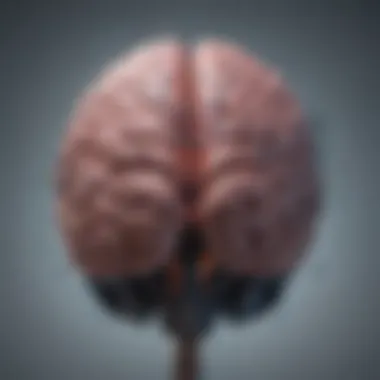Unlocking the Mysteries: The Profound Influence of Music on the Brain


Understanding the Influence of Music on the Brain
This article delves into the intricate relationship between music and the brain, unraveling the profound impact that music has on various cognitive functions and emotional responses. Music serves as a powerful stimulant for neural pathways, eliciting stimulating responses within the brain. It is fascinating to explore how music can influence mood and memory, creating a dynamic interplay between art and science.
Cognitive Functions and Music
On a cognitive level, music has been found to have a significant impact on various functions of the brain. Research indicates that listening to music can enhance cognitive abilities such as attention, memory, and even problem-solving skills. Furthermore, the structural elements of music, such as rhythm and melody, can stimulate different areas of the brain, contributing to improved cognitive processing and neural connectivity.
Emotional Responses to Music
Music has the remarkable ability to evoke a wide range of emotions, from joy and excitement to nostalgia and sadness. The emotional responses elicited by music are deeply connected to the brain's limbic system, which plays a crucial role in processing emotions and forming emotional memories. Understanding how music triggers emotional cues in the brain offers valuable insights into the complex interplay between auditory stimuli and emotional experiences.
Memory and Musical Perception
The relationship between music and memory is a fascinating area of study, highlighting how music can impact the encoding, storage, and retrieval of memories. Music has been shown to enhance memory retention and cognitive functions in both healthy individuals and those with cognitive impairments. As such, exploring the mechanisms through which music influences memory can provide valuable implications for cognitive enhancement and therapeutic interventions.
Conclusion
Introduction
Defining Music
Historical Evolution of Music
The historical evolution of music holds a significant place in our exploration, showcasing how music has evolved over time and its pivotal role in shaping cultural identities worldwide. By tracing the origins and development of musical forms, we can appreciate the rich tapestry of musical expression and its influence on human societies. Recognizing the historical context of music allows us to grasp its enduring impact on human experiences, underscoring the essence of music as a universal language that transcends boundaries of time and space.
Cultural Significance of Music
Turning our focus towards the cultural significance of music, we unravel its profound impact on societies and individuals, reflecting the diverse values and beliefs ingrained in musical traditions. From ceremonial rituals to everyday experiences, music permeates every aspect of human life, resonating with emotional, spiritual, and communal dimensions. Understanding the cultural contexts in which music functions broadens our appreciation for its role as a conduit for self-expression, social cohesion, and artistic innovation.
Brain Functionality
Neurological Processes During Music Perception
Delving into the neurological processes during music perception sheds light on how the brain responds to musical stimuli, highlighting the intricate interplay between auditory processing, emotion regulation, and sensory integration. By examining the neuronal mechanisms activated during music listening, we uncover the sophisticated pathways through which music modulates cognitive functions and emotional states, illuminating the dynamic nature of musical engagement on brain function.
Impact of Music on Different Brain Regions
Exploring the impact of music on different brain regions unveils the diverse neural networks influenced by musical stimuli, showcasing how music can stimulate areas associated with memory, reward processing, and motor coordination. By dissecting the specific brain regions activated during music processing, we gain insights into the intricate neural circuitry that underlies the cognitive, emotional, and physiological responses elicited by music, highlighting the multifaceted effects of music on brain function.


Emotional Responses
Music's Role in Emotional Regulation
Examining music's role in emotional regulation illuminates its therapeutic potential in modulating affective states, offering a pathway to emotional self-regulation and psychological well-being. By exploring the mechanisms through which music influences emotional processing, we uncover how music can serve as a powerful tool for managing stress, enhancing mood, and fostering emotional resilience. Understanding the emotional regulatory functions of music deepens our comprehension of its transformative impact on mental health and emotional balance.
Neurochemical Basis of Music-Induced Emotions
Diving into the neurochemical basis of music-induced emotions unveils the intricate interplay between music and brain chemistry, elucidating how music can modulate neurotransmitter systems implicated in mood regulation, reward processing, and stress response. By unraveling the neurobiological mechanisms underlying music-evoked emotions, we gain a nuanced understanding of how music can induce profound emotional experiences, shaping our affective states and psychological well-being through its neurochemical effects.
Cognitive Effects
Enhancement of Cognitive Abilities Through Music
Exploring the enhancement of cognitive abilities through music unveils the cognitive benefits of musical engagement, highlighting how music can enhance attention, memory, and problem-solving skills. By examining the cognitive processes involved in music learning and performance, we discern the cognitive mechanisms through which music promotes neural plasticity, executive function, and cognitive flexibility. Recognizing the cognitive effects of music broadens our understanding of its potential to optimize cognitive performance and enhance learning outcomes.
Memory Formation and Music
Investigating memory formation and music elucidates the role of music in memory encoding, retrieval, and consolidation, underscoring its mnemonic effects on cognitive processes and autobiographical memory. By exploring the synergistic relationship between music and memory, we uncover how music can serve as a potent mnemonic device, facilitating memory retention, emotional recollection, and autobiographical narratives. Understanding the mnemonic properties of music offers valuable insights into leveraging music for memory enhancement and cognitive rehabilitation.
Neuroscientific Perspectives
In delving into the intricate relationship between music and the brain, the section on Neuroscientific Perspectives assumes vital importance. This segment serves as the foundation for understanding the scientific underpinnings of how music impacts cognitive functions and emotional responses. By exploring Neuroscientific Perspectives, we can unravel the neural mechanisms that come into play when we experience music on a cerebral level, contributing significantly to our overall comprehension of this fascinating subject. This section aims to elucidate the specific elements, benefits, and considerations regarding Neuroscientific Perspectives in the context of music's influence on the brain.
Neural Plasticity
Music's Role in Promoting Neural Plasticity
It is imperative to discuss the pivotal role that music plays in promoting neural plasticity within the brain. This aspect focuses on how engaging with music can enhance the brain's ability to adapt and rewire itself, fostering neuroplasticity. The distinct characteristic of music in promoting neural plasticity lies in its capacity to stimulate various regions of the brain concurrently, which ultimately leads to improved cognitive function and neural connectivity. The unique feature of music's role in promoting neural plasticity lies in its ability to facilitate learning, memory retention, and cognitive flexibility, making it a favorable choice for investigation in this article. While its advantages are evident in promoting brain health and enhancing learning outcomes, considerations revolving around individual differences in responses to music must also be acknowledged.
Implications for Brain Health and Learning
Exploring the implications of music for brain health and learning reveals the substantial benefits that music can offer in maintaining brain function and supporting learning processes. By delving into how music influences neural plasticity, we unveil its potential in promoting brain health by staving off cognitive decline and facilitating learning efficiency. The key characteristic of these implications lies in music's ability to engage various cognitive functions simultaneously, thereby enhancing cognitive reserves and translational learning. The advantageous position of music in promoting brain health and learning within this article stems from its holistic impact on brain functionality and cognitive well-being. However, it is essential to consider individual variation in responses to music and potential limitations in generalizing its effects on brain health and learning.
Dopaminergic Pathways
Effects of Music on Dopamine Release
Reward Mechanisms in the Brain


An intriguing discussion point revolves around the role of music in activating reward mechanisms within the brain. This aspect concentrates on how music can stimulate the brain's reward centers, eliciting pleasurable sensations and reinforcing specific neural pathways. The key characteristic of reward mechanisms in the brain concerning music pertains to its capacity to evoke emotional responses and shape behavioral patterns through repeated listening. Music's unique feature in influencing reward mechanisms lies in its integration of sensory and emotional cues, making it a preferred choice for examination in this article. While the advantages of music in activating reward mechanisms include promoting positive mood states and enhancing motivation, potential disadvantages may arise in cases of desensitization or reliance on music for emotional regulation.
Psychological Impacts
Psychological impacts in the context of this article highlight the significant influence of music on mental well-being. Music plays a pivotal role in shaping emotional responses and cognitive functions, offering a profound insight into the intricate connection between art and neuroscience.
Stress Reduction
Music's Role in Alleviating Stress
Music's ability to alleviate stress is a crucial element in exploring the psychological impacts of music. The therapeutic nature of music in calming the mind and reducing stress levels is well-documented. The soothing melodies and rhythms stimulate relaxation responses in the brain, leading to a sense of calm and tranquility. It serves as a go-to choice in promoting emotional well-being and fostering a peaceful state of mind.
Physiological Responses to Calming Music
The physiological responses triggered by calming music have a significant contribution to stress reduction. Listening to calming music can positively impact physiological functions such as lowering blood pressure, reducing heart rate, and decreasing cortisol levels. These responses translate into a reduction in stress-related symptoms and an overall improvement in physical and mental well-being. While the unique feature of music's impact on physiological responses is its non-invasive and accessible nature, it may have limitations in effectively addressing chronic stress or severe mental health conditions.
Mood Regulation
Effects of Music on Mood States
Examining the effects of music on mood states underscores its ability to modulate emotions effectively. Music has the power to evoke a wide range of emotions, from joy and excitement to relaxation and introspection. By influencing mood states, music can serve as a versatile tool in managing emotional well-being and promoting psychological balance.
Music Therapy for Mood Disorders
Music therapy for mood disorders is a valuable intervention method that falls under the umbrella of mood regulation. Through structured music sessions with trained therapists, individuals can explore and express their feelings, leading to emotional catharsis and inner healing. The personalized nature of music therapy allows for tailored approaches to address specific mood disorders, providing a holistic and effective solution. However, its limitations may lie in the dependence on individual preferences and the need for skilled professional guidance.
Emotion Processing
Music's Impact on Emotional Processing
The impact of music on emotional processing delves into how music enhances the understanding and regulation of emotions. Music has the ability to evoke deep emotional responses and trigger introspection, leading to a deeper understanding of one's feelings and reactions. By influencing emotional processing, music can be a powerful tool in promoting emotional intelligence and psychological well-being.
Therapeutic Applications in Psychology
Therapeutic applications of music in psychology emphasize its role in promoting mental health and well-being. Music therapy interventions can target various psychological issues, such as anxiety, depression, and trauma, offering a creative outlet for individuals to explore and address their emotional challenges. The unique feature of music therapy lies in its non-verbal communication aspect, allowing for nuanced expression and emotional release. However, challenges in standardizing treatment protocols and ensuring consistent outcomes may pose limitations in widespread adoption.
Practical Applications
Music Therapy


Clinical uses of music therapy
When we consider the Clinical uses of music therapy, we uncover a profound method that leverages music's therapeutic properties to aid individuals in various healthcare settings. The integration of music into therapeutic practices plays a crucial role in enhancing overall well-being. Patients undergoing treatments find solace and relief through the harmonious vibrations of carefully selected music, contributing significantly to their healing process. The tailored approach of music therapy meets the individual's needs, making it a highly personalized and efficacious intervention.
Efficacy in treating various conditions
Exploring the Efficacy in treating various conditions through music therapy enlightens us on the wide-ranging impact this intervention can have. From mental health disorders to physical rehabilitation, music therapy emerges as a versatile and reliable tool. Its ability to transcend language barriers and connect with individuals on an emotional level distinguishes it as a universal therapeutic modality. The flexibility of music therapy in addressing diverse conditions underscores its efficacy across a spectrum of healthcare practices, making it a valuable asset in comprehensive treatment plans.
Educational Benefits
Delving into the intersection of music and education reveals a symbiotic relationship that enhances learning outcomes across academic settings. By integrating music into educational curricula, educators tap into a multifaceted resource that transcends traditional teaching methods. The Integration of music in education stimulates cognitive functions, fosters creativity, and cultivates holistic development among students. This innovative approach not only enriches the learning experience but also cultivates an appreciation for the arts, nurturing well-rounded individuals.
Enhancing learning outcomes
The concept of Enhancing learning outcomes through music underscores its transformative impact on academic performance. Studies have shown that incorporating music into educational practices boosts memory retention, promotes active engagement, and cultivates a conducive learning environment. By infusing music into lesson plans, educators empower students to explore complex concepts through a creative lens, fostering self-expression and critical thinking skills. The symbiotic relationship between music and learning paves the way for comprehensive knowledge acquisition and retention, laying a strong foundation for scholastic excellence.
Productivity Enhancement
Unlocking the potential of music to enhance productivity sheds light on its capacity to optimize work environments and augment cognitive functions. Music's impact on concentration proves instrumental in fostering a focused mindset, enabling individuals to channel their energy towards tasks with heightened efficiency. Whether in a bustling office setting or a solo workspace, the strategic use of music can create a conducive atmosphere that promotes productivity and creativity.
Music's impact on concentration
Delving into Music's impact on concentration reveals how auditory stimuli can modulate attention levels, improve information processing, and sustain focus over extended periods. The rhythmic patterns and melodic sequences of music engage cognitive faculties, enhancing cognitive performance and mitigating distractions. By strategically incorporating music into work routines, individuals can harness its cognitive benefits to optimize concentration and task execution, leading to heightened productivity and performance.
Optimizing work environments through music
Optimizing work environments through music involves tailoring auditory experiences to align with specific work demands, fostering a harmonious balance between focus and relaxation. By curating playlists that cater to the task at hand, individuals can create an ambient backdrop that promotes workflow efficiency and mental clarity. The adaptive nature of music in shaping work environments bolsters employee morale, reduces stress levels, and cultivates a conducive atmosphere for collaboration and innovation. Through thoughtful integration of music, organizations can cultivate a dynamic work environment that prioritizes employee well-being and productivity.
Future Research Directions
Technological Advancements
Neuroimaging studies on music and the brain
Exploring neuroimaging studies on music and the brain unveils a realm of scientific inquiry that transcends traditional boundaries. These studies enable researchers to peer into the brain's activity during musical experiences, offering invaluable insights into how music influences various cognitive functions. Neuroimaging techniques, such as functional magnetic resonance imaging (f MRI) and positron emission tomography (PET), provide a window into the brain's responses to music, allowing for a detailed examination of neural processes. By leveraging the benefits of neuroimaging studies, researchers can unravel the intricate neural pathways involved in music perception and cognition, paving the way for groundbreaking discoveries in the field.
Emerging technologies for brain-music research
The emergence of cutting-edge technologies heralds a new era in brain-music research, revolutionizing our approach to studying the impact of music on cognitive function. From advanced neuroimaging techniques to innovative computational tools, these technologies offer unprecedented opportunities to delve deeper into the complexities of music-brain interactions. By harnessing the power of emerging technologies, researchers can uncover novel insights into how music shapes neural connectivity and modulates brain activity. The integration of these state-of-the-art tools into research endeavors not only enhances the precision and scope of investigations but also opens doors to new frontiers in understanding the transformative power of music on the brain.
Interdisciplinary Studies
In the vast landscape of music and neuroscience, interdisciplinary studies play a pivotal role in fostering a comprehensive understanding of how music influences the brain. Collaborations between neuroscientists and musicians bring together diverse expertise, blending scientific rigor with artistic creativity to unravel the mysteries of music cognition. By bridging the gap between different disciplines, such collaborations enrich research endeavors, offering multifaceted perspectives on the impact of music on cognitive and emotional processes. With a focus on synergy and innovation, interdisciplinary studies pave the way for holistic exploration, illuminating the complexities of music-brain interactions from a multitude of angles.
Clinical Innovations
Within the realm of clinical practice, innovations in personalized music interventions hold immense promise for transforming healthcare approaches and enhancing patient outcomes. By tailoring music-based therapies to individuals' specific needs and preferences, personalized interventions offer a personalized approach to healing and well-being. These interventions capitalize on the inherent therapeutic properties of music, harnessing its ability to stimulate emotional responses and enhance cognitive functions. Leveraging the potential of music in precision medicine opens up new pathways for addressing complex health challenges, highlighting the transformative impact of personalized music interventions in healthcare settings.



